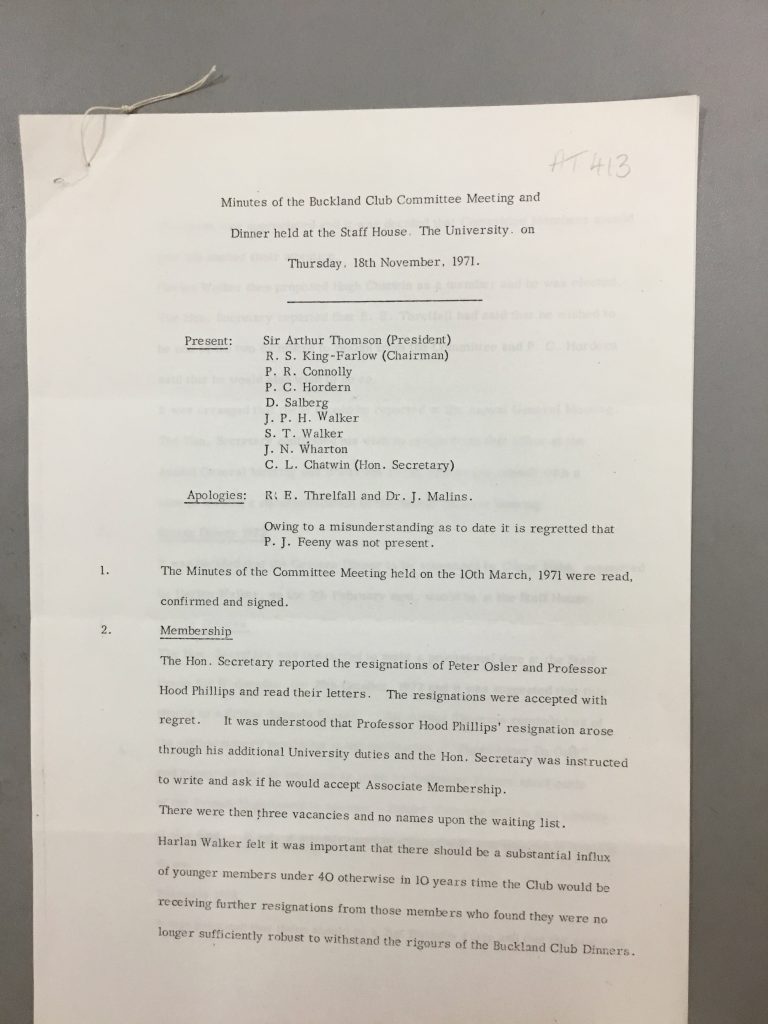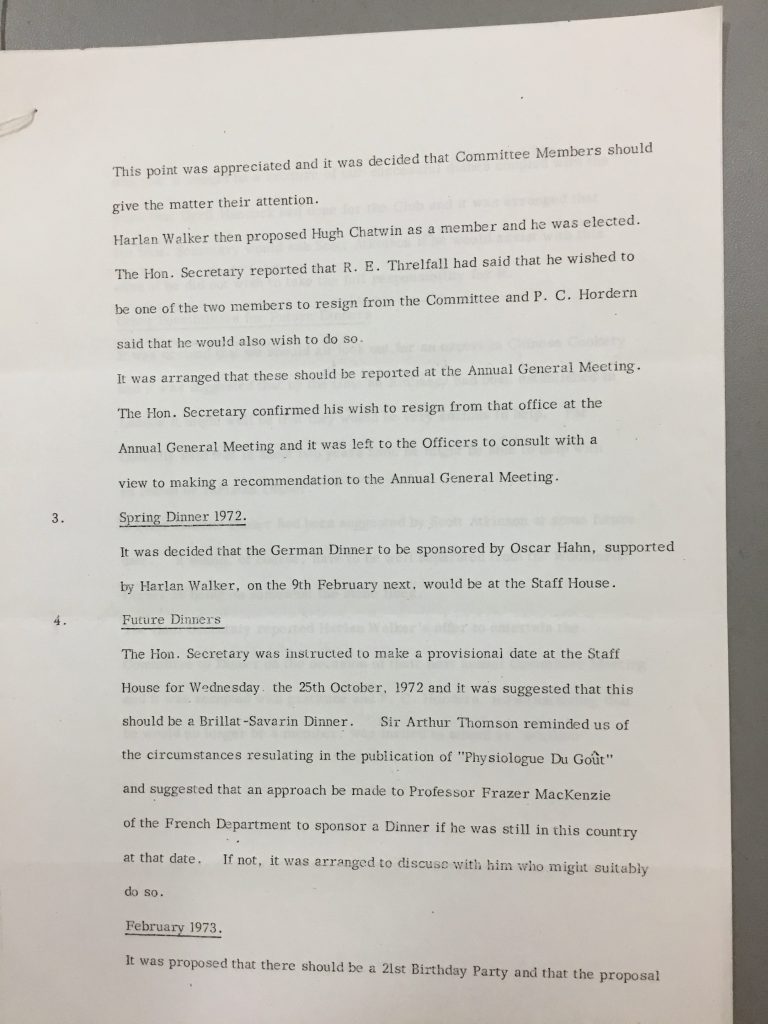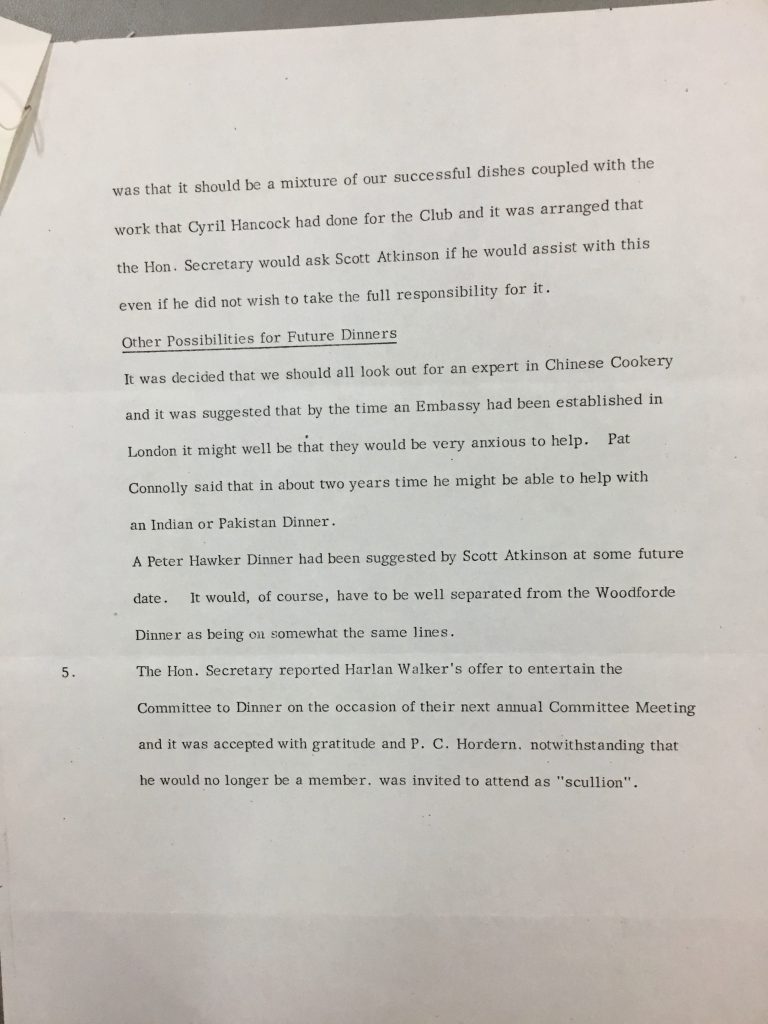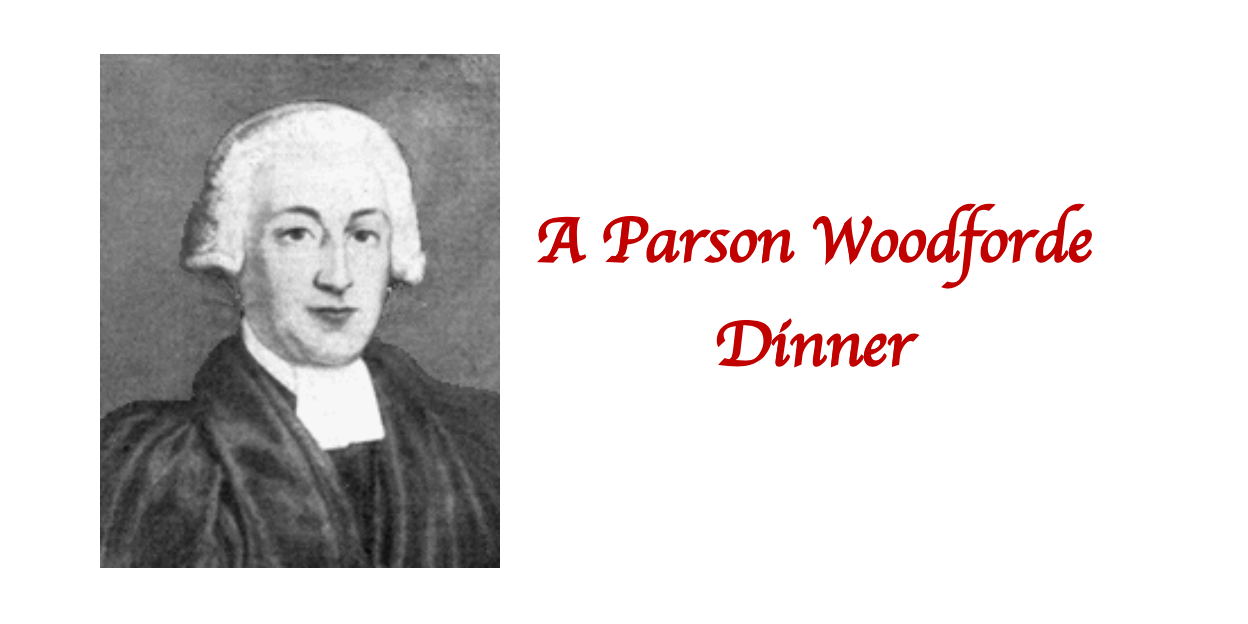Date: Wednesday 27th October 1971
Venue: Staff House, University of Birmingham
Sponsor: Dr. John Enticknap assisted by R.E. Threlfall
Minutes of a Parson Woodforde Dinner
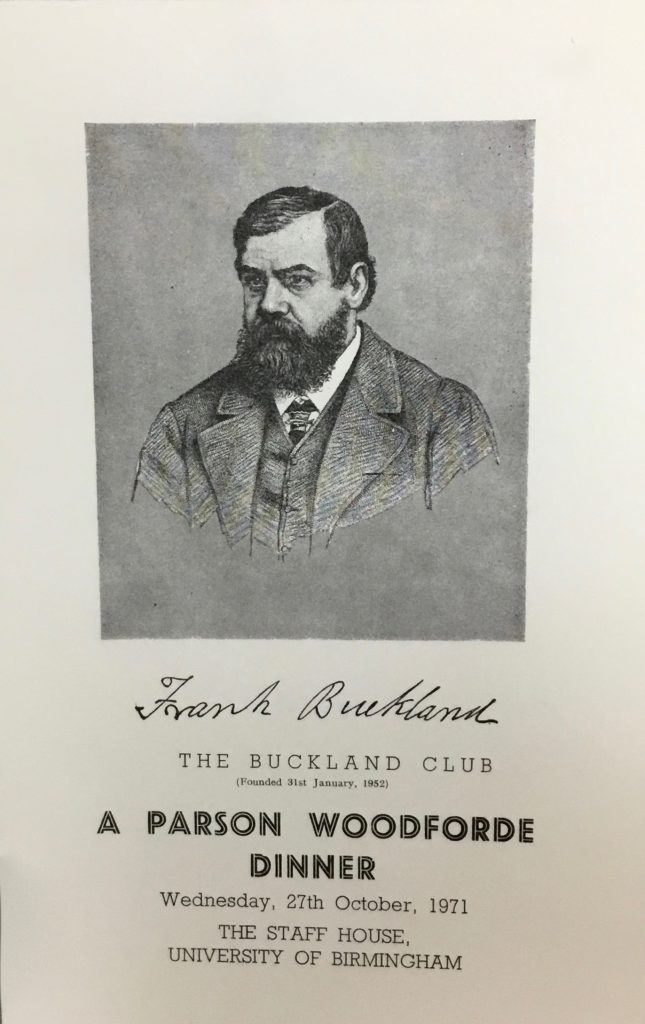
A meeting of the Club was held at The Staff House, The University of Birmingham, on the 27th October, 1971, when Dr. John Enticknap sponsored a Parson Woodforde Dinner. R. E. Threlfall acted, in his own words, as “Sponsor’s Apprentice”. R. S. King-Farlow, the Chairman, introduced Dr. Enticknap and reminded us that not only was he extremely learned on Parson Woodforde and his diary, and a prominent member of the Parson Woodforde Society, but also that he had been the Secretary of the Wine Society Dining Club.
It is of particular interest for one who has to write these minutes to observe not only what is eaten and what is said, but how the manners, customs, and atmosphere of the time are reflected in the meals we eat and in the methods of presentation by the respective Sponsors.
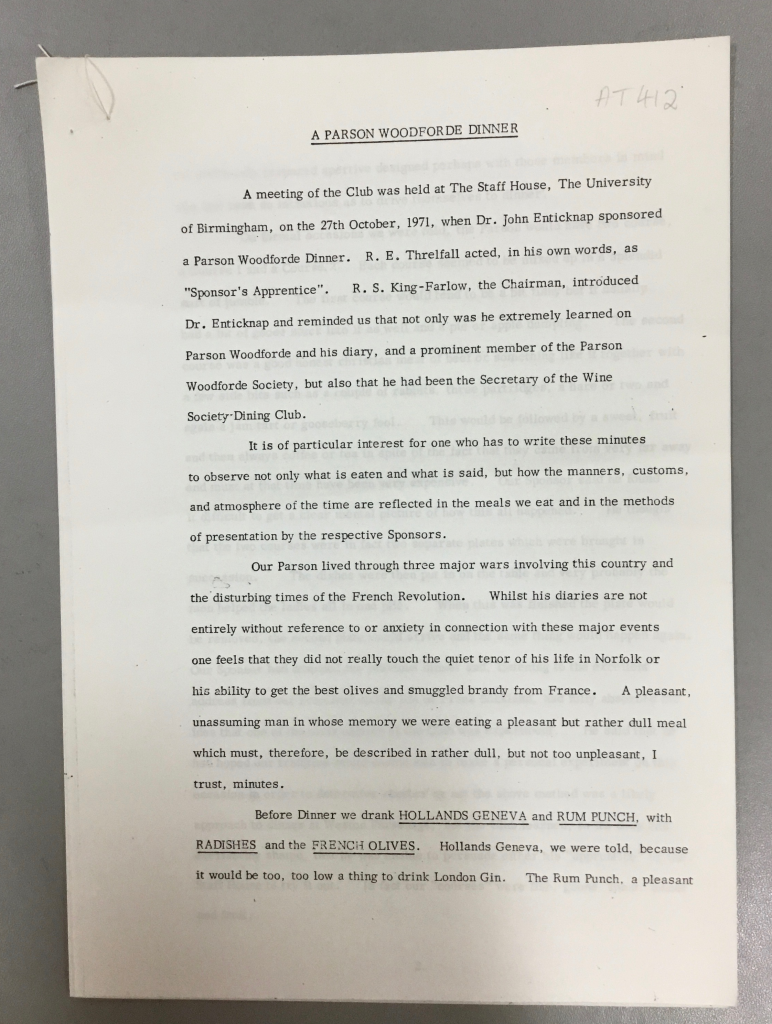
Our Parson lived through three major wars involving this country and the disturbing times of the French Revolution. Whilst his diaries are not entirely without reference to or anxiety in connection with these major events one feels that they did not really touch the quiet tenor of his life in Norfolk or his ability to get the best olives and smuggled brandy from France.  A pleasant, unassuming man in whose memory we were eating a pleasant but rather dull meal which must therefore, be described in rather dull, but not too unpleasant, I trust minutes.
A pleasant, unassuming man in whose memory we were eating a pleasant but rather dull meal which must therefore, be described in rather dull, but not too unpleasant, I trust minutes.
Before Dinner we drank HOLLANDS GENEVA and RUM PUNCH, with RADISHES and the FRENCH OLIVES. Hollands Geneva, we were told, because it would be too, too low a thing to drink London Gin. The Rum Punch, a pleasant but cautiously prepared aperitive designed perhaps with those members in mind who had been so incautious as to drive themselves to dinner.
0n formal occasions we were told, the Parson would have two course, a Course 1 and a Course 2. Each course seemed to be mixed up in a splendid sort of jumble. The first course would tend to be a bit fishy but it usually had a bit of goose stuck into it as well and a pie or apple dumpling. The second course was a good honest christian meat of beef or something like it together with a few side bits such as a couple of rabbits, three partridges, a hare or two and again a jam tart or gooseberry fool. This would be followed by a sweet, fruit and then always coffee or tea in spite of the fact that they came from very far away and must at that time have been very expensive. Our Sponsor said he found it difficult to get a clear mental picture of how this all happened. He thought that the two courses were in fact two separate plates which were brought in succession. The dishes were then put in on the table and very probably the men helped the ladies all in one pile. When this was finished the plate would be removed, the second plate would arrive and the same thing would happen again.
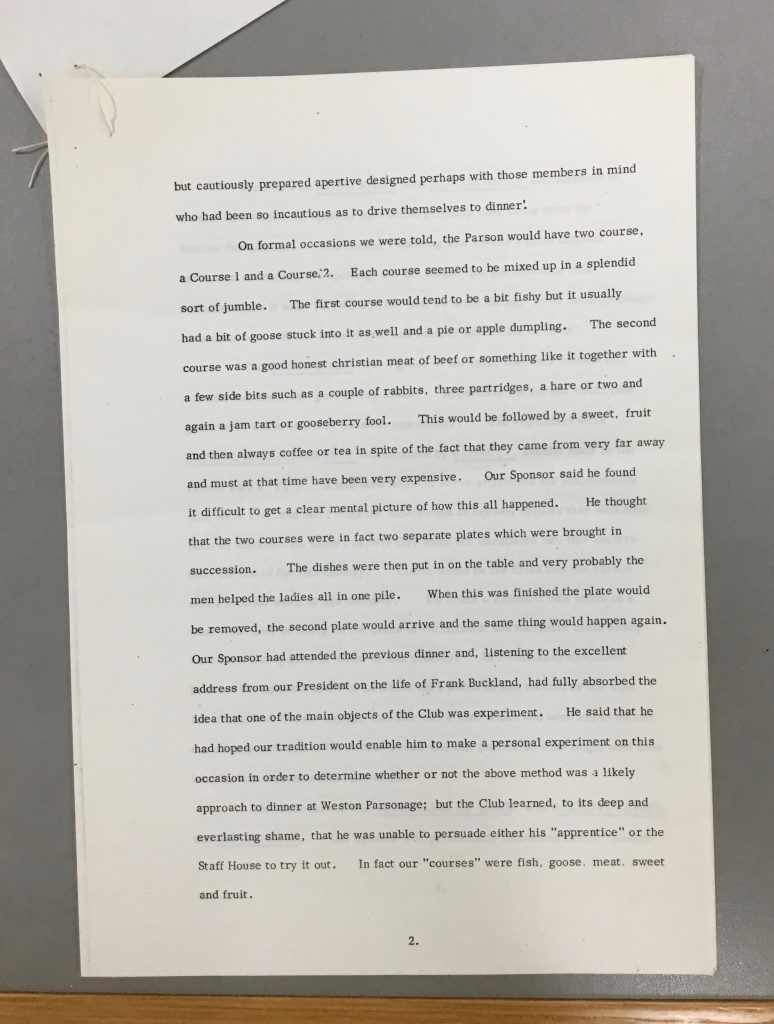
Our Sponsor had attended the previous dinner and, listening to the excellent address from our President on the life of Frank Buckland, had fully absorbed the idea that one of the main objects of the Club was experiment. He said that he had hoped our tradition would enable him to make a personal experiment on this occasion in order to determine whether or not the above method was a likely approach to dinner at Weston Parsonage; but the Club learned to its deep and everlasting shame, that he was unable to persuade either his “apprentice” or the Staff House to try it out. In fact our ”courses” were fish. goose meat, sweet and fruit.
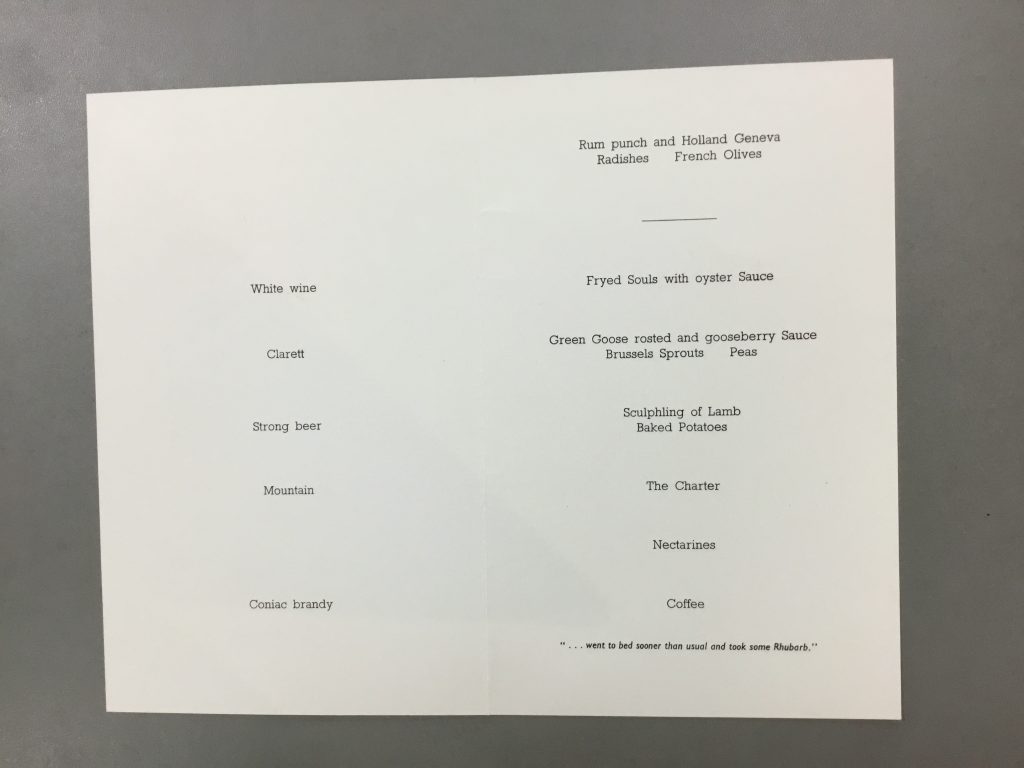
The fish was FRIED SOLES with OYSTER SAUCE accompanied by a white wine which the Sponsor said would probably have come from the Iberian Peninsular. The Parson’s spelling was always a little original but it was not merely his spelling, but his ideas, that got mixed on this occasion since it was “FRYED SOULS” that we were eating; some anthropophagic (sic) idea connected with the fires of Hell and Eternal Damnation no doubt.
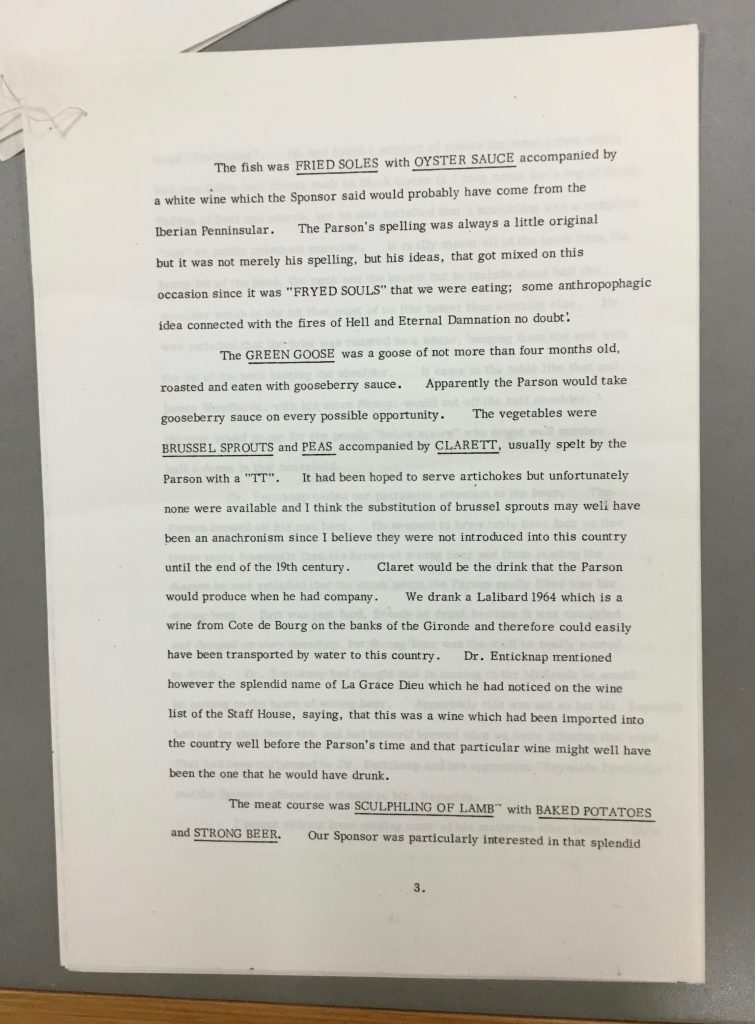
The GREEN GOOSE was a goose of not more than four months old, roasted and eaten with gooseberry sauce. Apparently the Parson would take gooseberry sauce on every possible opportunity. The vegetables were BRUSSEL SPROUTS and PEAS accompanied by CLARETT, usually spelt by the Parson with a “IT”. It had been hoped to serve artichokes but unfortunately none were available and I think the substitution of brussel sprouts may well have been an anachronism since I believe they were not introduced into this country until the end of the 19th century. Claret would be the drink that the Parson would produce when he had company. We drank a Lalibard 1964 which is a wine from Cote de Bourg on the banks of the Gironde and therefore could easily have been transported by water to this country. Dr. Enticknap mentioned however the splendid name of La Grace Dieu which he had noticed on the wine list of the Staff House, saying. that this was a wine which had been imported into the country well before the Parson’s time and that particular wine might well have been the one that he would have drunk.
The meat course was SCULPHLING OF LAMB with BAKED POTATOES and STRONG BEER. Our Sponsor was particularly interested in that splendid word “Sculphling”. He had found a number of names for meat joints Which had now fallen into disuse such as Mock Goose (a fancy name for a leg of Pork), Dobbin of Beef and others, but he was satisfied that a sculphling was a complete “con” or public relations exercise. It really meant all of the lamb from the boney bit of the head, the neck and the breast but to include about half the shoulder which is the bit that most of us like better than anything else. He was satisfied that the joint was roasted as a whole, hanging from the spit with the fat of the neck basting the shoulder. It came to the table like that and James Woodforde, with his niece Nancy, would cut off the half shoulder, the rest would go out for the people “below stairs” who might well number half a dozen in that household.
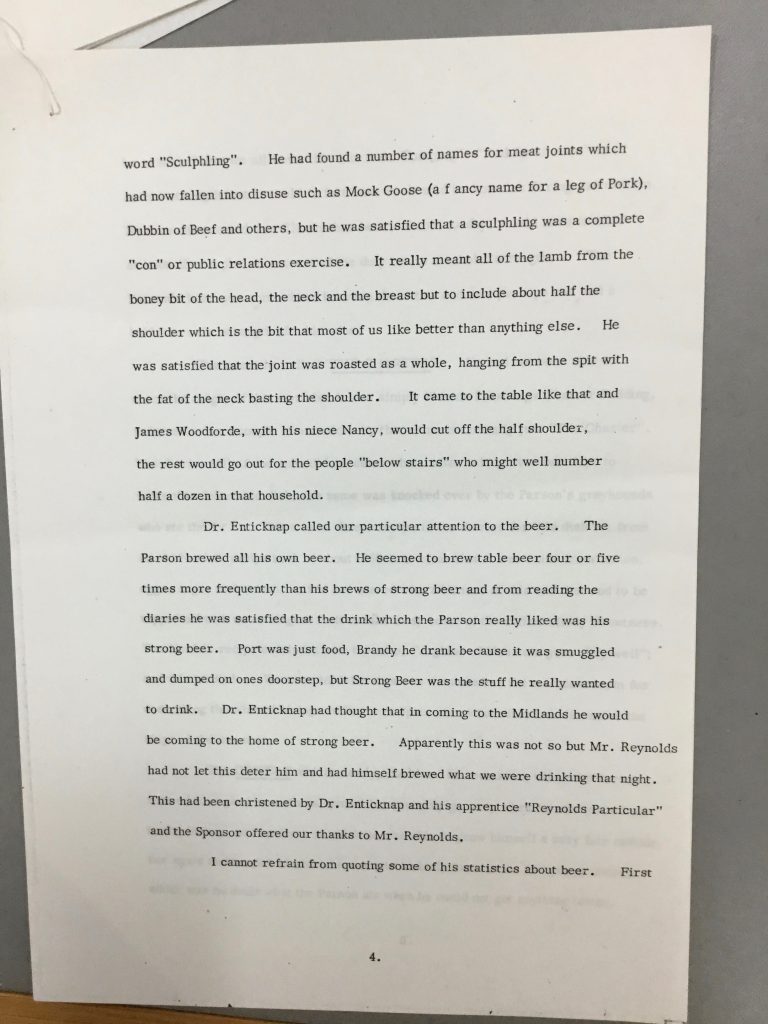
Dr. Enticknap called our particular attention to the beer. The Parson brewed all his own beer. He seemed to brew table beer four or five times more frequently than his brews of strong beer and from reading the diaries he was satisfied that the drink which the Parson really liked was his strong beer. Port was just food, Brandy he drank because it was smuggled and dumped on ones doorstep, but Strong Beer was the stuff he really wanted to drink. Dr. Enticknap had thought that in coming to the Midlands he would be coming to the home of strong beer. Apparently this was not so but Mr. Reynolds had not let this deter him and had himself brewed what we were drinking that night. This had been christened by Dr. Enticknap and his apprentice “Reynolds Particular” and the Sponsor offered our thanks to Mr. Reynolds.
I cannot refrain from quoting some of his statistics about beer. First he assumed that we all knew that a certain Company’s “Red Revolution” is of such a strength that it could in fact have been sold in America during prohibition. He then commented that Elizabethan beer, if sold to day, would have fetched at least 15s. a pint on account of the duty on its alcoholic strength. The Parson’s beer was somewhere between these two and was perhaps one and a half times the strength of table wine .
The sweet he called “THE CHARTER”: He had not been able to trace the origin of this word but it was simply Weston Parsonage Charter Pudding, referred to on a couple of occasions by that name but usually just “The Charter”. The diaries tell of one splendid occasion when, after taking over two days to make this delectable dish, the same was knocked over by the Parson’s greyhounds who ate the lot. There is no direct recipe in the diaries for this dish but from an old Norfolk recipe book of about 1780 it is clear that it was made from lemon, eggs, sugar and cream, mixed and sieved with additions of this and that and to be topped off with an astringent fruit to take away some of the rather sickly sweetness. The Norfolk recipe concludes with the note, “A glass of Mountain goes very well”; and this we had. We were told that this was then used as the technical term for describing the wine of Malaga in Southern Spain where the vineyards lie under the slope of the mounts.
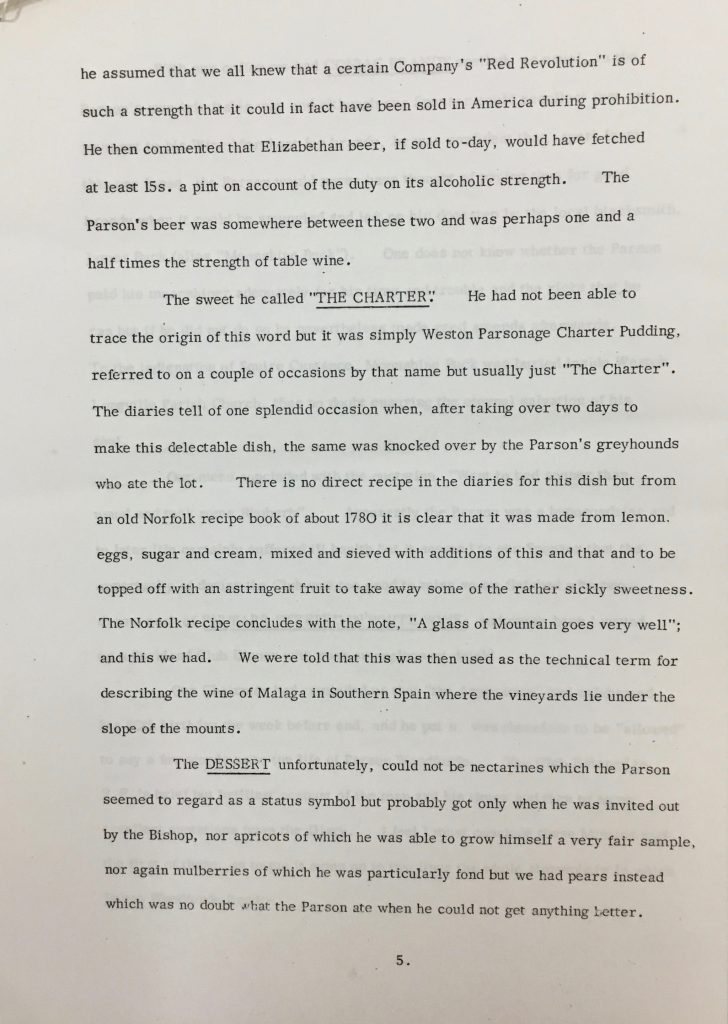
The DESSERT unfortunately, could not be nectarines which the Parson seemed to regard as a status symbol but probably got only when he was invited out by the Bishop, nor apricots of which he was able to grow himself a very fair sample, nor again mulberries of which he was particularly fond but we had pears instead which was no doubt what the Parson ate when he could not get anything better.
With our coffee we had CONIAC BRANDY spelled, as usual, in the Parson’s own inimitable way and although our Sponsor could recollect just one payment to his Wine Merchant for brandy, he was confident that, apart from this one lapse, the Parson would never have thought of paying thus for good brandy when it could be smuggled and left on his doorstep by the local blacksmith, James Buck (alias “Moonshine Buck”). One does not know whether the Parson paid his moonshiner adequately for his time and trouble and the risks that he ran but if he did not do so he nevertheless made good amends afterwards.To the indignation of Squire Custance, Moonshine Buck was buried inside Weston Longville Parish Church, thus no doubt ensuring the eternal salvation of his soul.
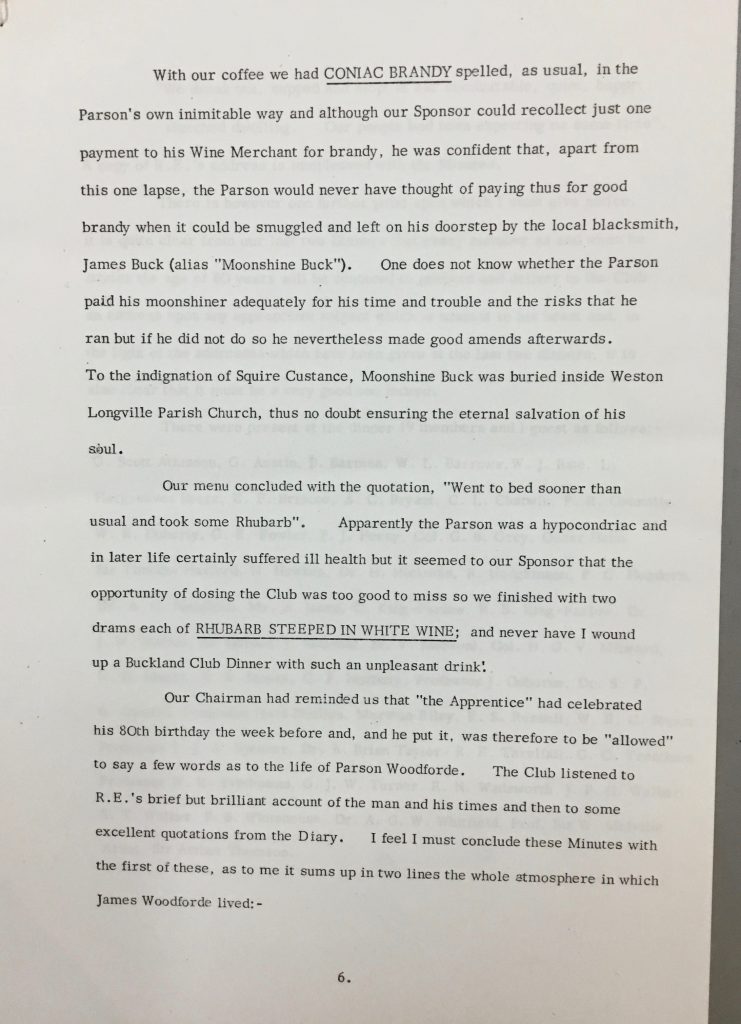
Our menu concluded with the quotation, “Went to bed sooner than usual and took Some Rhubarb”. Apparently the Parson was a hypochondriac and in later life certainly suffered ill health but it seemed to our Sponsor that the opportunity of dosing the Club was too good to miss so we finished with two drams each of RHUBARB STEEPED IN WHITE WINE; and never have I wound up a Buckland Club Dinner with such an unpleasant drink‘.
Our Chairman had reminded us that “the Apprentice” had celebrated his 80th birthday the week before and, and he put it. was therefore to be “allowed” to say a few words as to the life of Parson Woodforde. The Club listened to R.E. ‘s brief but brilliant account of the man and his times and then to some excellent quotations from the Diary. I feel I must conclude these Minutes with the first of these, as to me it sums up in two lines the whole atmosphere in which James Woodforde lived:-
“We drank tea, supped and slept at our comfortable, quiet, happy, thatched dwelling. Our people had been expecting us some time”. A copy of R.E.’s address is interleaved with the Minutes.
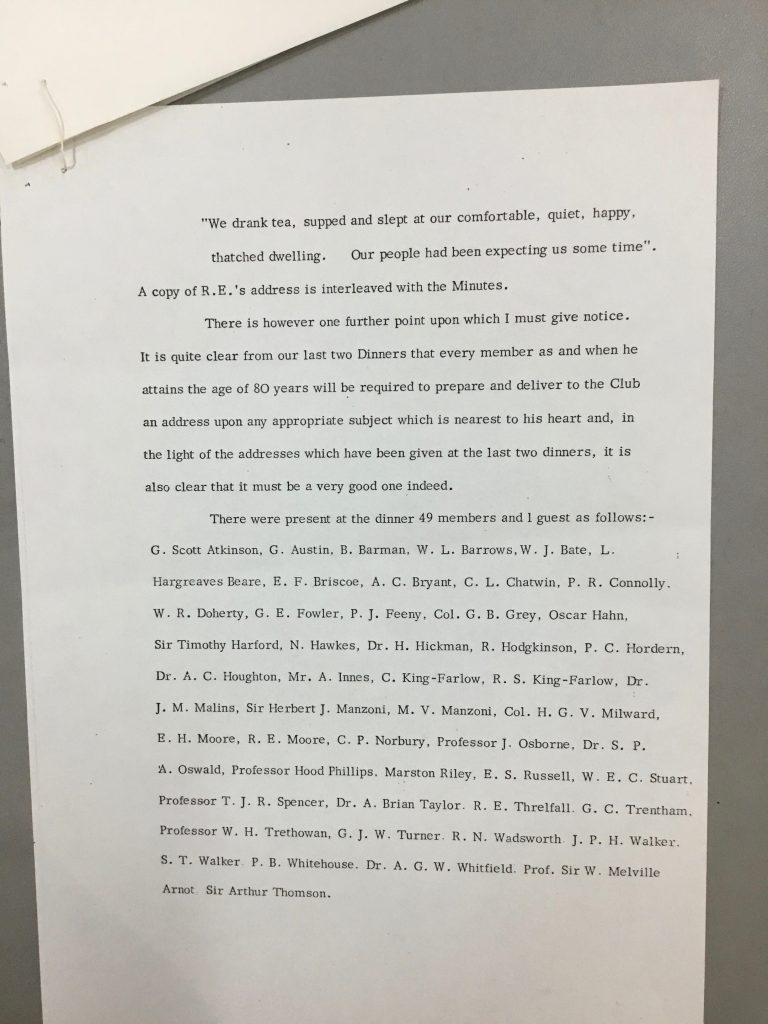 T
T
here is however one further point upon which I must give notice. it is quite clear from our last two Dinners that every member as and when he attains the age of 80 years will be required to prepare and deliver to the Club an address upon any appropriate subject which is nearest to his heart and, in the light of the addresses which have been given at the last two dinners, it is also clear that it much be a very good one indeed.
There were present 49 members and one guest…
Committee Minutes – 18th November 1971
I have included below minutes from the committee meeting of 18th November 1971. They are to be found in Sir Arthur Thompson’s papers that are held in the Cadbury Research Library at Birmingham University.
Apart from providing an example of the general workings of the committee, which remains pretty similar nearly fifty years later, Harlan Walker’s insight and wisdom is greatly evident. The need to recruit younger members remains; indeed, it is partly responsible for the creation of this website.
APM
Chairman
October 2019
